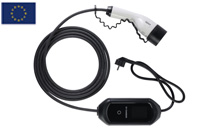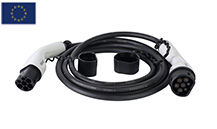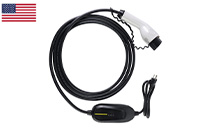Driven by the "double carbon" background, government subsidy policies and rising fossil fuel prices, global EV sales continue to increase, and EV charging infrastructure such as charging piles are further developed as a supporting industry chain.According to the report, the global EV charging cable market will reach USD 431 million in 2021 and is expected to increase to USD 3,173 million by 2027, growing at a CAGR of 39.5%.
Currently, charging posts are located in charging stations, parking lots, hotels, communities, garages, and other areas. According to the speed of charging, there are fast charging piles and slow charging piles, fast charging piles are AC (alternating current) charging piles and slow charging piles are DC (direct current) charging piles.
DC charging piles are high-power, high-current transmission, which generates a lot of heat, so the cables used are also thicker. While using AC piles to charge electric cars is slower, usually taking several hours to be fully charged, and the wire diameter of the cable is also thinner than DC pile cables.
As we all know, electric vehicle charging needs charging cables to connect the car with the charging infrastructure, and the quality of the cables directly affects the safety of electric vehicle charging, which puts forward high requirements for charging cables. And UL is a world-renowned and authoritative organization for cable safety certification and testing, so what are the requirements for UL-certified EV charging cable selection?
UL briefly describes the criteria for judging the good or bad quality of charging post cables.
1. The cable will be frequently dragged and squeezed during the charging process. The product should have high flexibility, wear resistance and crack resistance.
2, the charging post is mostly used for outdoor use, and the outdoor temperature is high, the American Standard UL cable certification company believes that better heat resistance can ensure the safe use and long life of the cable.
3, in the process of using the charging post for charging to control the voltage and current of the car. ul company believes that in order to ensure the stability and safety of charging, the cable must have high voltage resistance, high temperature resistance, anti-interference, stable data signal transmission, oil resistance, moisture resistance, acid and alkali resistance, UV resistance and other characteristics.
In the background of energy saving and emission reduction, the rapid development of electric vehicles is the trend of the times, and EV charging cable, as its supporting infrastructure, will also "benefit greatly". Based on this background, FAFA-E focuses on the latest technology trends in the cable industry, insists on technological innovation as the guide, constantly seizes the development opportunities, provides safe and high quality cables for customers as the concept, and uses professional products to win customers' praise. Our products comply with UL62 standard, if you need, please contact us.






 简体中文
简体中文
